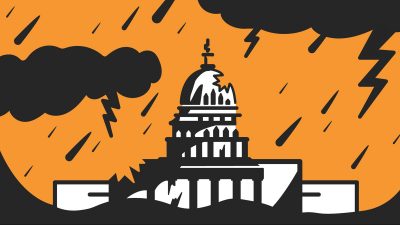American Democracy’s Theater of the Absurd

All Global Research articles can be read in 51 languages by activating the Translate Website button below the author’s name (only available in desktop version).
To receive Global Research’s Daily Newsletter (selected articles), click here.
Click the share button above to email/forward this article to your friends and colleagues. Follow us on Instagram and Twitter and subscribe to our Telegram Channel. Feel free to repost and share widely Global Research articles.
Spread the Truth, Refer a Friend to Global Research
***
Since the end of the Cold War and the Clinton administration coming to power in 1992, the United States has undergone a systemic decay in its political body. Policies increasingly favor the interests of an oligarchic and powerful elite more often than not at the expense of the public. The rise of ultra-liberal policies to create a secular society built upon an amoral technocratic paradigm, which includes the current “woke” movement, critical race theory (CRT), and diversity, inclusion, and equity (DIE) requirements, have further intensified societal divisions and tribal factions at odds with traditional conservative and family values.
The media, which once served as a pillar of democracy, is today nothing but a tool for social and political manipulation. Since the 1990s, media conglomerates have consolidated power, aligning themselves with either of the two party political ideologies and agendas. This alignment has led to biased reporting and the amplification of divisive rhetoric. The rise of cable news networks such as Fox News and MSNBC has contributed to a polarized media landscape where the public is presented with only one-sided partisan perspectives. This polarization is then further extended to social media platforms, where algorithms prioritize sensational and divisive content, further entrenching cultural divides. As George Orwell famously remarked, “The most effective way to destroy people is to deny and obliterate their own understanding of their history.”
Deliberate government tactics to keep the population divided has destroyed social coherence, the sense of unity and shared purpose within a society. Such tactics succeed by keeping people mentally distracted. This strategy of “divide and conquer” ensures that the public remains distracted and disorganized, preventing a unified challenge to the status quo. Identity politics, for instance, has been leveraged to create and exacerbate social divisions.
“The most dangerous man to any government is the man who is able to think things out for himself,” wrote essayist H.L. Mencken in the early 20th century. “Almost inevitably, he comes to the conclusion that the government he lives under is dishonest, insane, and intolerable.”
Mencken’s quote underscores the consequence of a corrupt political system that fosters division only to maintain control. By encouraging cultural fragmentation, those in power divert attention from their failings and prevent unified opposition.
A clear example of this tactic is seen in the handling of racial and ethnic tensions. Political leaders exploit these tensions to rally their base, diverting attention from broader systemic issues such as economic inequality, corporate corruption and federal agency capture. The government’s response to movements like Black Lives Matter is mixed, with some politicians using the movement to stoke fears, race baiting, among certain demographics while failing to address the root causes of racial injustice.
The deliberate use of social issues to create division is not new. As Niccolò Machiavelli observed,
“The wise ruler, whenever he can, will subdue the people by force or by fraud.”
By keeping the population focused on cultural and social battles, the government can operate without substantial public scrutiny or opposition. Power then resorts to manipulation and coercion to maintain control and stability. Particularly in our post-9/11 era, this Machiavellian principle is evident in the draconian policies and practices designed to maintain control over the populace. These measures, masquerading as the need for national security, reflect the use of both force and fraud to subdue and manipulate public sentiment.
The Patriot Act significantly expanded the government’s surveillance capabilities. The Act allowed for the indefinite detention of immigrants, expanded the powers of law enforcement agencies to search personal records without a court order, and increased the ability to monitor phone and email communications. It facilitated government intrusion into the private lives of every American. The National Defense Authorization Act (NDAA) further threatened and undermined constitutional protections and civil liberties including indefinite detention of American citizens without trial. The revelations by Edward Snowden in 2013 highlighted the extent of the National Security Agency’s (NSA) surveillance programs, which included the bulk collection of phone metadata and internet communications of millions of Americans. This extensive surveillance infrastructure represents a clear example of subduing the populace by fraud.
In addition, the rise of digital platforms and social media has introduced new avenues for both surveillance and censorship. Governments and private companies have increasingly collaborated to monitor and control online content, often under the guise of combating misinformation and maintaining public order. This intersection of public and private surveillance mechanisms creates an environment where dissent and alternative viewpoints can be easily suppressed, further aligning with Machiavelli’s notion of subduing the populace by fraudulent means.
The impact of government policies favoring the elite is most acutely felt by the underprivileged and poor. According to a joint investigation conducted by Princeton and Northwestern universities, economic policies since the Clinton administration have prioritized the interests of Wall street and the multinational behemoths of defense, pharmaceutical, chemical and energy industries, leading to increased income inequality and reduced social mobility. The welfare reforms of the 1990s, for instance, aimed to reduce dependency on government assistance have accomplished the opposite by increasing hardships for many vulnerable populations.
The deregulation of financial markets, which culminated in the 2008 financial crisis, tossed the citizens of Main Street into the gutter. Washington’s incompetence led to a housing market collapse, widespread unemployment, and a severe recession. While large financial institutions received substantial bailouts, many ordinary Americans faced foreclosure, unemployment, and financial ruin. As Nobel laureate Joseph Stiglitz noted,
“The gap between what our economic and political systems were supposed to deliver — rising living standards for most citizens — and what they actually delivered became intolerable.”
That is exactly what is happening today, and worse.
The regulatory capture by private corporate interests over government agencies has further exacerbated social and economic inequalities. Regulatory bodies that are supposed to protect public welfare are now fully co-opted by the industries they regulate. This is especially true of the pharmaceutical industrial complex’s domination of the FDA and CDC. The approval of opioid medications, heavily influenced by pharmaceutical lobbying, has led to an opioid epidemic that has devastated communities across the country. Purdue Pharma, the maker of OxyContin, aggressively marketed the drug while downplaying its addictive potential, leading to widespread addiction and overdose deaths. And for years the legislators and officials in our compromised duopoly did nothing.
Similarly, the revolving door between Wall Street and government agencies like the Securities and Exchange Commission (SEC) undermines regulatory oversight. Former executives from major financial institutions take key regulatory positions, ensuring that policies remain favorable to their former employers.
The suppression of fundamental democratic principles by those in power is a significant consequence of systemic decay. Voter suppression, gerrymandering, and the disproportionate influence of money in politics undermine fair representation and accountability. These actions prevent the public from exercising their democratic rights and perpetuate the control of a minority elite. The disenfranchisement of marginalized communities through restrictive voting laws is a prime example. Measures such as voter ID laws, purging voter rolls, and limiting early voting disproportionately affect low-income and minority voters. These tactics ensure that the political power remains concentrated among those who support the elite’s agenda.
The influence of money in politics further exacerbates this issue. The landmark Supreme Court decision in Citizens United v. Federal Election Commission in 2010 allowed for unlimited corporate spending in elections, amplifying the political power of wealthy individuals and corporations. This decision has led to an influx of “dark money” in politics, where the interests of the few outweigh the needs of the many.
President Franklin D. Roosevelt warned,
“The liberty of a democracy is not safe if the people tolerate the growth of private power to a point where it becomes stronger than their democratic state itself.”
Seventy years later money in politics has broken the very fabric of democracy, creating an oligarchic regime that enslaves the public.
All of this has enormous psychological consequences because someone must be blamed for this decay and rot in Washington. One acknowledged way to relieve stress is to act out, and often with vitriolic aggression. The emergence of ultra-liberal policies regarding race, the “woke” movement, and the emphasis on critical race theory (CRT), and diversity, inclusion, and equity (DIE) mandates in public spaces and institutions have intensified societal divisions. These policies, while aimed at addressing historical injustices and promoting inclusivity, have accomplished the opposite and sparked equally aggressive backlashes from conservative and traditional value-based communities.
Critical race theory, which examines the intersection of race and law and its impact on racial inequality, has arisen out of nowhere as a flashpoint in American politics. Proponents argue that CRT provides a necessary framework for understanding systemic racism and advocating for social justice; however, CRT’s critics contend that it promotes a divisive view of society, pitting racial groups against one another and undermining the notion of a shared national identity.
The implementation of diversity, inclusion, and equity mandates in workplaces and educational institutions, although perhaps originally with good intentions, has shown itself to be exceedingly undemocratic, unconstitutional, and coercive and counterproductive. Such policies prioritize identity over merit and foster a culture of victimhood and entitlement. This perception is fuelling resentment and polarization, further fracturing social cohesion.
The “woke” movement, purported to represent heightened awareness of social injustices and advocacy for marginalized groups, has likewise accomplished the opposite by increasing societal antagonism. John Stuart Mill observed,
“He who knows only his own side of the case knows little of that.”
Woke’s militant and uncompromising approach alienates individuals who feel their values and beliefs are under attack. This alienation is exacerbated by the woke and radicalized LGBTQ+ movements to label dissenting opinions as inherently racist, extremist and even fascist. Consequently all openings for dialogue and constructive debate are stifled. The vilification of opposing views has created an environment where ideological entrenchment and hostility thrive. But this dynamic only benefits those in power by diverting attention from the more dire systemic issues and prevents the formation of a unified front against political corruption and the elite’s dominance over our lives.
Looking back, when did this rot and decay across America take hold? We would argue that it was during the Clinton years that Washington’s draconian policies, either intentional or naïve, had the most profound and far-reaching effects on the nation’s culture, social coherence, and welfare for the underprivileged and poor. Machiavelli’s observation that a wise ruler will subdue the people by force or by fraud remains highly relevant in the context of modern governance. The policies and practices implemented in the US, including the repeal of Glass-Steagall, the Patriot Act, the NDAA, and extensive surveillance measures, illustrate how our government has used both coercion and manipulation to maintain control. These measures have destroyed our civil liberties and democratic principles. As history and contemporary events demonstrate, the balance between security and liberty is delicate, and the government’s use of force and fraud to maintain power is now the greatest enemy to democratic ideals.
*
Note to readers: Please click the share button above. Follow us on Instagram and Twitter and subscribe to our Telegram Channel. Feel free to repost and share widely Global Research articles.
Richard Gale is the Executive Producer of the Progressive Radio Network and a former Senior Research Analyst in the biotechnology and genomic industries.
Dr. Gary Null is host of the nation’s longest running public radio program on alternative and nutritional health and a multi-award-winning documentary film director, including his recent Last Call to Tomorrow.
They are regular contributors to Global Research.
Featured image is from Vox



